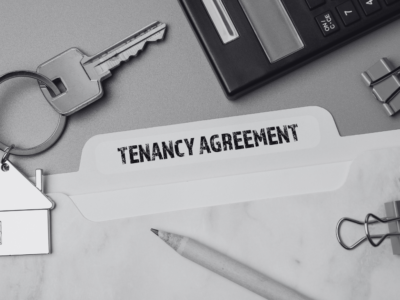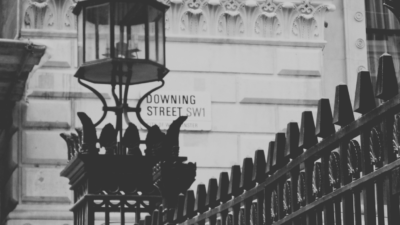Annual house price growth was unchanged at -5.3% in September. Prices were also flat over the month, after taking account of seasonal effects, following the 0.8% decline seen in August.
Housing market activity remains weak, with just 45,400 mortgages approved for house purchase in August, c.30% below the monthly average prevailing in 2019 before the pandemic struck.
This relatively subdued picture is not surprising given the more challenging picture for housing affordability.
For example, someone earning an average income and purchasing the typical first-time buyer home with a 20% deposit would spend 38% of their take home pay on their monthly mortgage payment – well above the long-run average of 29%.
However, investors have marked down their expectations for the future path of Bank Rate in recent months amid signs that underlying inflation pressures in the UK economy are finally easing, and with labour market conditions softening.
This in turn has put downward pressure on longer term interest rates which underpin fixed rate mortgage pricing, commented Robert Gardner, Nationwide’s Chief Economist.
Gardner continued, if sustained, this will ease some of the pressure on those remortgaging or looking to buy a home.
Nevertheless, with Bank Rate not expected to decline significantly in the years ahead, borrowing costs are unlikely to return to the historic lows seen in the aftermath of the pandemic.
Instead, it appears more likely that a combination of solid income growth together with modestly lower house prices and mortgage rates will gradually improve affordability over time, with housing market activity remaining fairly subdued in the interim.
Flats underperformed in recent years
As we noted in our August report, there are signs that more buyers are looking towards smaller, less expensive properties, with transaction volumes for flats holding up better than other property types.
This may be because affordability for flats has held up relatively better as they experienced less of a price increase over the pandemic period.
Where average prices for flats have increased by 12% since the start of the pandemic – half the 24% increase recorded for detached properties.
Despite signs of demand for flats holding up a little better more recently, the price underperformance has continued in the most recent quarterly data, with flats seeing the largest year-on-year fall (-5.7%), compared to -3.6% for detached, -4.6% for semi-detached and -5.3% for terraced properties.
All regions saw annual price falls in Q3
Our regional house price indices are produced quarterly with data for Q3 (three months to September) showing annual price declines in all regions.
The South West was the weakest performing region, with prices down 6.3% year on year, while Northern Ireland remained the best performing region, with a modest 1.8% fall.
Wales saw a sharp slowing in the annual rate of change to -5.4%, from -1.4% last quarter.
While Scotland also saw a slowing in annual house price growth to -4.2%, from -1.5% in Q2.
Across northern England (which comprises North, North West, Yorkshire & The Humber, East Midlands and West Midlands), prices were down 3.9% compared with Q3 2022.
The North was the strongest performing northern region, with the annual rate of change improving from -3.3% to -2.0%, while the East Midlands was the weakest, with a 5.5% decline.
Meanwhile southern England (South West, Outer South East, Outer Metropolitan, London and East Anglia) saw a 4.8% year-on-year fall.
London was the best performing southern region, although still saw a 3.8% annual decline ,Gardner concluded.
| Headlines | Sept-23 | Aug-23 |
|---|---|---|
| Monthly Index* | 511.7 | 511.9 |
| Monthly Change* | -0.0% | -0.8% |
| Annual Change | -5.3% | -5.3% |
| Average Price(not seasonally adjusted) | £257,808 | £259,153 |
Tom Bill, head of UK residential research at Knight Frank, comments:
“Fourteen consecutive rate rises have taken their toll on the property market but more stable lending conditions means buyers and sellers will be able to catch their breath.
The number of people rolling off more favourable fixed-rate mortgages won’t fall in 2024, but sentiment should improve as volatility reduces.
We think most of the UK’s house price correction will happen this year and modest single-digit annual growth will return after the next general election.”
Jeremy Leaf, north London estate agent and a former RICS residential chairman, comments:
“Although the Nationwide house price index is an historically-reliable indicator of market health, broader economic factors are just as compelling.
Successive increases in base rate and lender nervousness have meant those with cash have been playing a more significant role now that buyers continue to hold sway.
In our offices, we are not seeing talk of a market correction – rather, promising signs of falling mortgage rates, though modest so far are encouraging viewings and helping to keep existing sales alive.”
Tomer Aboody, director of property lender MT Finance, comments:
“As mortgage rates fluctuate on a daily basis, buyers and sellers are uncertain as to where the market is, which makes for instability and lower transaction volumes.
With the Bank of England holding rates in September, confidence may start creeping back in, especially if we there is another hold in rates at the next meeting.
Mortgages are slightly cheaper, which will hopefully encourage buyers and sellers to act in the final quarter.”
Anna Clare Harper, CEO of sustainable investment adviser GreenResi, comments:
“Softer pricing is unsurprising as higher interest rates have a much larger impact on affordability than asking prices.
Last year’s pricing levels, which were buoyed up artificially by policies such as the stamp duty holiday and very low interest rates, are no longer achievable.
However, unlike commercial property such as offices, which in many cases have fallen in value by 20-30%, it’s unlikely that we experience a full house price crash.
Firstly, this is due to the ‘necessity’ of housing. We all need a roof over our heads.
Secondly, a large proportion of the market are owned outright, and they are unaffected by mortgage interest rates. For this reason, fears of a ‘house price crash’ are unrealistic.
The challenge is less around house prices and more around the shortage of rental homes, which are in ever greater demand due to reduced affordability of buying a home.
The relative stability of house prices combined with a growing supply shortage in rental is encouraging new institutional investment, and this is essential for ‘Generation Rent’.”
Mark Harris, chief executive of mortgage broker SPF Private Clients, comments:
“While a trend is developing among lenders with regard to mortgage rate reductions, pricing is still rather higher than many have grown used to over the past few years.
Those buyers relying on mortgages are inevitably going to be more price sensitive on the back of ongoing affordability concerns.
That said, the welcome hold in interest rates at the Bank of England’s September meeting will help buyer confidence, hopeful that the worst is behind us and that if inflation continues to decline, so too will the base rate.
Lenders are keen to do business before year-end, which should be reflected in improved mortgage pricing in the final quarter of the year.
However, the days of rock-bottom rates are long gone and borrowers need to get used to paying more for their mortgages.”





















Comments